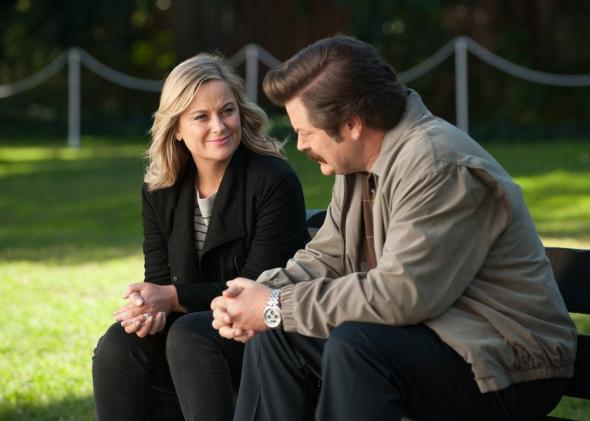It’s fitting that, in the end, the perennially almost-canceled Parks and Recreation lasted for a respectable seven seasons on NBC: It’s very Leslie Knope of it. Over the course of its run, Parks, which ended Tuesday night, proved to be much like its heroine: indefatigable, unstoppable, and huge-hearted. Parks demonstrated that comedy can thrive amongst nice, kind, decent people who are dedicated to doing their very best. Nothing, not even a surprisingly unfunny and saccharine finale, can take away from the series’ legacy as a comedy unique for being as touching as it was hilarious. The episode congratulated itself for its own sweetness, instead of recognizing that a hint of sourness has always been part of what made Parks and Recreation so delicious.
The herky-jerky finale eschewed rhythm and jokes to bring us tales from the future. Over the course of the final hour, we were given a peek at how life turned out for Leslie, Ben, Tom, April and all the rest of the gang. For a group of onetime, small-town civic employees, they all did impossibly well. Their futures were all outsize, their lives long, full not just of perfect marriages and perfect children, but fame, fortune, recognition, and regular games of charades with the Bidens. Leslie becomes governor of Indiana; Ron a 50 percent owner of Lagavulin and the head of a National Park; Donna starts a successful and altruistic nonprofit; Tom turns himself into a self-help guru; even Gary Gergich gets elected mayor 10 times and lives to be 100.
The Leslie of the show’s beginning could not be more different than the benevolent, beloved Leslie of the show’s end. Parks began as a spiritual spinoff of The Office (for a while during development, it was supposed to be an actual spinoff), a cringe-comedy starring Leslie as a Michael Scott–type, the irritating boss and wannabe who tries too hard. But Parks and Recreation swiftly recalibrated, abandoning the comedy of awkwardness to embrace something much sweeter. (It is not a coincidence that the leading business in Pawnee, Indiana is a company called Sweetums.) If, at the start, intense, ambitious, Hillary-admiring Leslie was a riff on Tracy Flick, as Parks came into its own and Leslie’s qualities were rendered in a more warm waffle-colored light, it became possible to see Tracy Flick as a riff on Leslie Knope, two sides of the coin of female political ambition.
This binary exists in every major character in the series: There is the jerk they would have been on another, more sour show—or, to steal a joke from Community, in Park’s darkest timeline—and the darling they were allowed to be on Parks. Gruff, principled, loyal, teddy-bear libertarian Ron Swanson is a Dwight Schrute, full of disdain and distaste for most other people, change, and smiling. Tom Haverford is an acquisitive fool, susceptible to all marketing ploys, and fixated on being rich and cool. Andy Dwyer is just an idiot. April Ludgate bitterly hates everyone and everything. Donna Meagle sits to the side and cuts everyone down. Chris Traeger is a New Age buffoon. Ben Wyatt is a dull, vanilla accounting nerd. On Parks all of these qualities have been run through a positivity machine that spits out the nicest, kindest, most well-meaning version of each and every one of these types. The group’s collective mean streak—their continual torture of hapless, sweet Jerry (now Gary) Gergich—only underscored their good natures: Their cruelty to him is so out of character, it’s a running gag.
But Parks has, up until this finale, had a strategic relationship with its own big heart. A little sugar, as they say, makes the medicine go down, and Parks has used sugar to make cynical lessons about dysfunctional government go down very easy. Sweetums, after all, has always been a corrupt, unthinking corporate citizen responsible for Pawnee’s obesity epidemic: It’s so sweet, it gets away with murder.
In the town of Pawnee, Indiana, Parks’ writers created a hotbed of civic malfeasance. In the finale, Chris Traeger says, “Ann Arbor is literally the greatest city I’ve ever lived in, but Pawnee is better.” This is a sentiment with which Leslie surely agrees, but the joke about Pawnee is that it has always actually been a kind of a hellhole, inhabited by glorious supporting characters—Jeremy Jamm, Perd Hapley, Joan Callamezzo, the Tammys, Jean-Ralphio and Mona-Lisa, and on and on—who may all love Lil’ Sebastian, but are still self-obsessed, idiotic, corrupt, spoiled, and obstructionist.
Pawnee is an American every-town, and yet it is so flawed that when Leslie Knope was finally elected to the city council, she was eventually recalled. There could be no one better suited to the job, and yet the citizens of Pawnee wouldn’t let her do it. For all the spoonfuls of sugar Parks heaped on us, it was also delivering medicine—a subtle commentary on the way human foibles and quirks can gum up the system and stymie even—literally—the most competent, dedicated woman in the world.
Parks and Recreation isn’t such a sweet show because it lives in a vacuum where nastiness, selfishness, and stupidity don’t exist, as they more or less didn’t in the finale. It’s such a sweet show because it exists exactly in the midst of such things and its characters try to rise above the muck and their own natures anyway, even when they don’t succeed. The finale had no hint of that muck. Luckily, there are 123 other episodes of this great series to balance it out.
